#outlining a book
Explore tagged Tumblr posts
Text
"you shouldnt use ai for schoolwork because its not actually helpful" this is true "and anyways if you cant even write a 600 word essay then you're stupid and an idiot" well now i think we've gone too far in the wrong direction.
#and this is just one example#replace 600 word essay with email/project outline/research project/book report/etcetera#boycritter et al
8K notes
·
View notes
Text
🧩 How to Outline Without Feeling Like You’re Dying
(a non-suffering writer’s guide to structure, sanity, and staying mildly hydrated)
Hey besties. Let’s talk outlines. Specifically: how to do them without crawling into the floorboards and screaming like a Victorian ghost.
If just hearing the word “outline” sends your brain into chaos-mode, welcome. You’re not broken, you’re just a writer whose process has been hijacked by Very Serious Advice™ that doesn’t fit you. You don’t need to build a military-grade beat sheet. You don’t need a sixteen-tab spreadsheet. You don’t need to suffer to be legitimate. You just need a structure that feels like it’s helping you, not haunting you.
So. Here’s how to outline your book without losing your soul (or all your serotonin).
—
🍓 1. Stop thinking of it as “outlining.” That word is cursed. Try “story sketch.” “Narrative roadmap.” “Planning soup.” Whatever gets your brain to chill out. The goal here is to understand your story, not architect it to death.
Outlining isn’t predicting everything. It’s just building a scaffold so your plot doesn't fall over mid-draft.
—
🧠 2. Find your plot skeleton. There are lots of plot structures floating around: 3-Act. Save the Cat. Hero’s Journey. Take what helps, ignore the rest.
If all else fails, try this dirt-simple one I use when my brain is mush:
Act I: What’s the problem?
Act II: Why can’t we fix it?
Act III: What finally makes us change?
Ending: What does that change cost?
You don’t need to fill in every detail. You just need to know what’s driving your character, what’s blocking them, and what choices will change them.
—
🛒 3. Make a “scene bucket list.” Before you start plotting in order, write down a list of scenes you know you want: key vibes, emotional beats, dramatic reveals, whatever.
These are your anchors. Even if you don’t know where they go yet, they’re proof your story already exists, it just needs connecting tissue.
Bonus: when you inevitably get stuck later, one of these might be the scene that pulls you back in.
—
🧩 4. Start with 5 key scenes. That’s it. Here’s a minimalist approach that won’t kill your momentum:
Opening (what sucks about their world?)
Catalyst (what throws them off course?)
Midpoint (what makes them confront themselves?)
Climax (what breaks or remakes them?)
Ending (what’s changed?)
Plot the spaces between those after you’ve nailed these. Think of it like nailing down corners of a poster before smoothing the rest.
You’re not “doing it wrong” if you start messy. A messy start is a start.
—
🔧 5. Use the outline to ask questions, not just answer them. Every section of your outline should provoke a question that the scene must answer.
Instead of: — “Chapter 5: Sarah finds a journal.”
Try: — “Chapter 5: What truth does Sarah find that complicates her next move?”
This makes your story active, not just a list of stuff that happens. Outlines aren’t just there to record, they’re tools for curiosity.
—
🪤 6. Beware of the Perfectionist Trap™. You will not get the entire plot perfect before you write. Don’t stall your momentum waiting for a divine lightning bolt of Clarity. You get clarity by writing.
Think of your outline as a map drawn in pencil, not ink. It’s allowed to evolve. It should evolve.
You’re not building a museum exhibit. You’re making a prototype.
—
🧼 7. Clean up after you start drafting. Here’s the secret: the first draft will teach you what the story’s actually about. You can go back and revise the outline to fit that. It’s not wasted work, it’s evolving scaffolding.
You don’t have to build the house before you live in it. You can live in the mess while you figure out where the kitchen goes.
—
🛟 8. If you’re a discovery writer, hybrid it. A lot of “pantsers” aren’t anti-outline, they’re just anti-stiff-outline. That’s fair.
Try using “signposts,” not full scenes:
Here’s a secret someone’s hiding.
Here’s the emotional breakdown scene.
Here’s a betrayal. Maybe not sure by who yet.
Let the plot breathe. Let the characters argue with your outline. That tension is where the fun happens.
—
🪴 TL;DR but emotionally: You don’t need a flawless outline to write a good book. You just need a loose net of ideas, a couple of emotional anchors, and the willingness to pivot when your story teaches you something new.
Outlines should support you, not suffocate you.
Let yourself try. Let it be imperfect. That’s where the good stuff lives.
Go forth and outline like a gently chaotic legend 🧃
— written with snacks in hand by Rin T. @ thewriteadviceforwriters 🍓🧠✍️
Sometimes the problem isn’t your plot. It’s your first 5 pages. Fix it here → 🖤 Free eBook: 5 Opening Pages Mistakes to Stop Making:
#writing#writing advice#writeblr#writers on tumblr#writing tips#writing help#how to write#story structure#writing process#plotting tips#writing guide#writing blog#writing community#writing support#tumblr writing community#writing inspiration#storytelling tips#how to outline#writing resources#novel writing#outline tips#plotting a novel#writing craft#novel planning#write a book#drafting a novel#writing motivation#first draft advice#fiction writing#character arcs
1K notes
·
View notes
Text


weidmaggedon bill
#my art#fanart#art#illustration#gravity falls#gravity falls fanart#the book of bill#tbob#stanford pines#ford pines#bill cipher#human bill#human bill cipher#human bill design#bill x ford#billford#artists on tumblr#weirdmaggedon bill does crazy things with my brain#like cmon bill you have this slay look with colorful outline of your bricks AND YOU CHOOSE STUPID YELLOW INSTEAD??#bill i will never forgive you for this
218 notes
·
View notes
Text
If you hate writing outlines it's because of how they're taught in school. Toss out indentation and Roman numerals and map out your writing how you want to. Outlines are your FRIEND, dammit. This goes for everything, from political essays to fanfiction. If it's written you need an outline because the outline is for you. It can be general, vague, or a mixture of both! Be as informal as you want, who cares. They're to keep you on track and keep your writing flowing, so don't disregard them even if you dreaded making them in grade school. My outlines by chapter tend to look like this: 1. Character "P" goes to the diner to meet character "Q."
2. "P" tells "Q" about how the confrontation went. (dialogue I thought up on a bus ride) That's when shit goes DOWN. They're yelling, they're drawing attention to themselves, but before they can take it outside, "P" says (dialogue I thought up in the shower).
3. THEN "Q" SAYS THAT ONE LINE THAT "R" SAYS TO HIM IN CHAPTER FIVE BECAUSE THAT'S CALLED COHESION WOOOOO
4. idk they both leave??? you'll figure it out later
5. Self-reflection for "P." Keep your main point on how his moral compass goes to extremes and hurts others. He finally is realizing that HE is the PROBLEM
6. "P" drives to "Q's" house to apologize but GUESS WHO ANSWERS THE DOOR it's "R" and then just end the chapter there This is coming from someone who didn't write with outlines for years. Now I don't write anything longer than 400 words without one! Make them your own, make them so that they're useful to you. That's their purpose, so accept the help!
#writers on tumblr#writing tumblr#writing help#writing advice#writing tips#writing blog#writer tips#writing motivation#outlining#book writing#novel writing#writeblr#writer#writing tip
3K notes
·
View notes
Text

bayek, doing some exploring :)
#assassin's creed#assassin's creed origins#bayek of siwa#SHRHSERHGHGHHhhhGHHGHH#manifesting a 2025 where i can achieve some kind of financial stability that lets me periodically justify taking a weekend off#to just draw some stuff and not feel some kind of awful chest crushing anxiety doom spiral about time wasted#anyway ive been chipping away at this one bc it took a million years to figure out how to achieve the sense of scale#i was imagining. also i read a book about akhenaten and it made my brain feel like it was turned to mush BUT it was extremely#interesting and now im deeply invested in a handful of egyptian dynasties#and somewhere in all of that i outlined two ac origins fan comics. after Acquiring Information on things#@ 2025 please PLEASE. give me a weekend where i can spend it all doing bayek fan comics#also i wish to acquire a new spine. i think. i slept on a much softer pillow than im used to and my entire body has been fucked for a week#like. my neck feels like a jenga tower where everything is out of place. and somehow. my hip feels TERRIBLE#i want to give my body some kind of deus ex upgrade. ehghhh
263 notes
·
View notes
Text
am I getting too convoluted if I said Johnny dies Dallas lives n Pony loses his hearing as a result of the way Dallas hits him (to put out the fire) when he pulls him out of the church au??
#idk man#this idea has been rotting in my head for a long time#i have like a terribly rough outline#where basically the events of the book happen exactly as canon up until post church fire#so pony johnny n dallas are in the hospital#n ponys reeling from literally everything that just happened#n he reunites with soda n darry n suddenly realizes like oh fuck#i cannot hear sodas hysterically releived laughter#or darrys voice as he thanks god ponys fine#n then the dr pulls darry aside n tells him that pony has profound hearing loss as a result of an injury sustained during the fire#the last voice he will ever have heard clearly is johnnys#johnny dies canon complicent#but before dallas can get himself shot by the cops darry gets to him first#so dallas survives#pony learns asl from a deaf woman who their family has always been familiar with#since their parents were always real keen on including people that the rest of the world looked down on#dallas has to deal with not only surviors guilt but feeling like he took something from Pony that can never be given back#he has his own arc with the woman#but it basically all boils down to deafness is not the LOSS of something#but rather just the ADDITION of a new community n language n experience#plus dallas learns sign n is just utterly overwhelmed by feelin like his hands can be used for somethin soft n good#UGH#if yall wanna hear more about this lemme know#bc i have been thinking about this for a WHILE#the outsiders#sodapop curtis#ponyboy curtis#darry curtis#dallas winston#the outsiders 1983
170 notes
·
View notes
Text
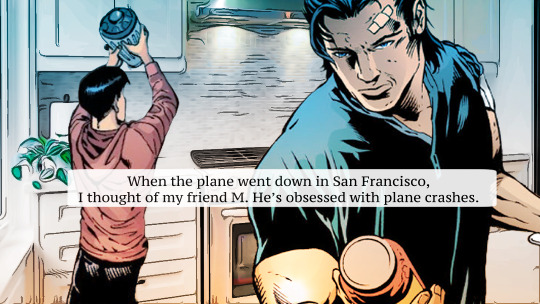
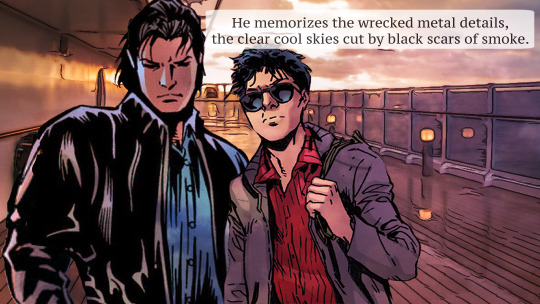


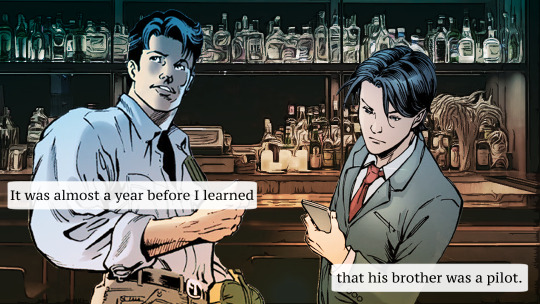
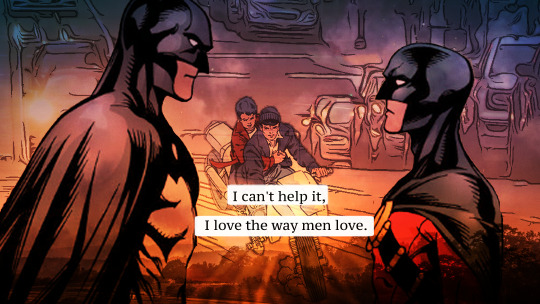
poem: "accident report in the tall, tall weeds" by ada limón
#when i started fussing with this it was going to be a pitch for that never-made comic series where tim moves to blüdhaven#when dick is injured and helps out as nightwing for a while#but then it felt weird having visuals and no text#so instead you get this poem i'm very attached to#it's like mmm okay it's reductive bc this is not actually just the way that men love but the poem is so good <3#dick grayson#tim drake#dick & tim#my comic art but we are using the term ''art'' loosely#since it's just copy-pasted pictures from the comics + unsplash photos + layering to add outlines/lighting#all the comic book art here is by marcus to + patrick zircher because they are my favorites <3#so red robin + zircher's run on nightwing
1K notes
·
View notes
Text
You don’t have to pay for that fancy worldbuilding program
As mentioned in this post about writing with executive dysfunction, if one of your reasons to keep procrastinating on starting your book is not being able to afford something like World Anvil or Campfire, I’m here to tell you those programs are a luxury, not a necessity: Enter Google Suite (not sponsored but gosh I wish).
MS Office offers more processing power and more fine-tuning, but Office is expensive and only autosaves to OneDrive, and I have a perfectly healthy grudge against OneDrive for failing to sync and losing 19k words of a WIP that I never got back.
Google’s sync has never failed me, and the Google apps (at least for iPhone) aren’t nearly as buggy and clunky as Microsoft’s. So today I’m outlining the system I used for my upcoming fantasy novel with all the helpful pictures and diagrams. Maybe this won’t work for you, maybe you have something else, and that’s okay! I refuse to pay for what I can get legally for free and sometimes Google’s simplicity is to its benefit.
The biggest downside is that you have to manually input and update your data, but as someone who loves organizing and made all these willingly and for fun, I don’t mind.
So. Let’s start with Google Sheets.
The Character Cheat Sheet:

I organized it this way for several reasons:
I can easily see which characters belong to which factions and how many I have named and have to keep up with for each faction
All names are in alphabetical order so when I have to come up with a new name, I can look at my list and pick a letter or a string of sounds I haven’t used as often (and then ignore it and start 8 names with A).
The strikethrough feature lets me keep track of which characters I kill off (yes, I changed it, so this remains spoiler-free)
It’s an easy place to go instead of scrolling up and down an entire manuscript for names I’ve forgotten, with every named character, however minor their role, all in one spot
Also on this page are spare names I’ll see randomly in other media (commercials, movie end credits, etc) and can add easily from my phone before I forget
Also on this page are my summary, my elevator pitch, and important character beats I could otherwise easily mess up, it helps stay consistent
*I also have on here not pictured an age timeline for all my vampires so I keep track of who’s older than who and how well I’ve staggered their ages relative to important events, but it’s made in Photoshop and too much of a pain to censor and add here
On other tabs, I keep track of location names, deities, made-up vocabulary and definitions, and my chapter word count.
The Word Count Guide:
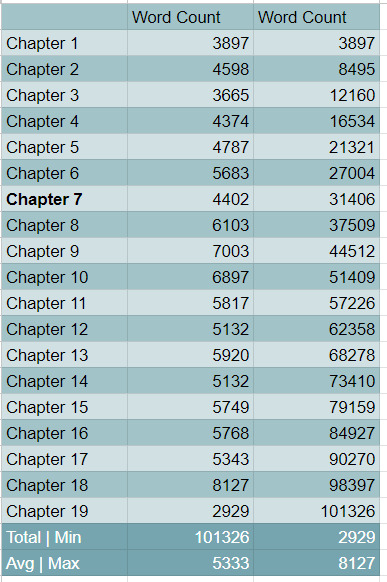
*3/30 Edit to update this chart to its full glory. Column 3 is a cumulative count. Most of what I write breaks 100k and it's fun watching the word count rise until it boils over.
This is the most frustrating to update manually, especially if you don’t have separate docs for each chapter, but it really helps me stay consistent with chapter lengths and the formula for calculating the average and rising totals is super basic.
Not that all your chapters have to be uniform, but if you care about that, this little chart is a fantastic visualizer.
If you have multiple narrators, and this book does, you can also keep track of how many POVs each narrator has, and how spread out they are. I didn’t do that for this book since it’s not an ensemble team and matters less, but I did for my sci-fi WIP, pictured below.

As I was writing that one, I had “scripted” the chapters before going back and writing out all the glorious narrative, and updated the symbols from “scripted” to “finished” accordingly.
I also have a pie chart that I had to make manually on a convoluted iPhone app to color coordinate specifically the way I wanted to easily tell who narrates the most out of the cast, and who needs more representation.
—
Google Docs
Can’t show you much here unfortunately but I’d like to take an aside to talk about my “scene bits” docs.
It’s what it says on the tin, an entire doc all labeled with different heading styles with blurbs for each scene I want to include at some point in the book so I can hop around easily. Whether they make it into the manuscript or not, all practice is good practice and I like to keep old ideas because they might be useful in unsuspecting ways later.
Separate from that, I keep most of my deleted scenes and scene chunks for, again, possible use later in a “deleted scenes” doc, all labeled accordingly.
When I designed my alien language for the sci-fi series, I created a Word doc dictionary and my own "translation" matrix, for easy look-up or word generation whenever I needed it (do y'all want a breakdown for creating foreign languages? It's so fun).
Normally, as with my sci-fi series, I have an entire doc filled with character sheets and important details, I just… didn’t do that for this book. But the point is—you can still make those for free on any word processing software, you don’t need fancy gadgets.
—
I hope this helps anyone struggling! It doesn’t have to be fancy. It doesn’t have to be expensive. Everything I made here, minus the aforementioned timeline and pie chart, was done with basic excel skills and the paint bucket tool. I imagine this can be applicable to games, comics, what have you, it knows no bounds!
Now you have one less excuse to sit down and start writing.
#writing advice#writing resources#writing tips#writing tools#writing a book#writing#writeblr#organizing your book#outlining#shut up and write the book#google sheets#google docs
1K notes
·
View notes
Text
Thea "I won't speak to you in mixed company" vs Cat's "can you point to the Raven in the room?" says all I need to say about why I dont like Muldani for Kevin
#tfc#tsc#aftg#anti Thea muldani#anti kevthea#I so rarely speak ill of Nora she can do no wrong and I could outline pages of why I cannot stand Thea but it would break my heart#these books are everything to me and Nora deserves the world#but I will never understand how Kevin ends up with the woman who is so Raven brainwashed she won't even speak to him#in front of ANDREW AND NEIL#his literal lifelines#and then parallel her to Kevin being in a room with Cat and Jean and her asking where the Raven is????#I don't GET IT
125 notes
·
View notes
Note
in the catwoman au do the bats still get attached to peter despite him hating them ?
oh absolutely. they don't meet Spider-Man until he's already teamed up with Catwoman and Stray, and she tells them that Spider-Man is her new "apprentice." Cat and Stray are very morally grey (even going as far as being friends with a few Gotham Rogues), so they have no idea what to think about Spider-Man for a while.
though they will get an idea. it's not too hard to track down his identity when he starts going to school with Dami. and once they start seeing Peter more often, and slowly start convincing Spider-Man to work with them, they can see that he's not as grey as Cat and Stray, just traumatized and acting out like a certain original Robin had done
(it's Tim that they have no clue about identity wise. Cat is less of a mother figure and far more of an aunt that lets you do what you want unless it is certain it'll get you killed. she has no hold on Stray and often encourages him towards the Bats. it'll be the same with Peter. She takes care of him and won't let him die (and she cares about him), but she's of the opinion that Peter needs more stability than she can provide
the Bats are more than willing to provide the stability. they just have to figure out how to get Peter to be chill with that.)
#though keep in mind im very much still outlining this fic#and LoF takes the priority#well my own original book takes priority#but fanfic wise LoF came first#erinwantstowrite#ao3#ao3 fanfic#leap of faith ao3#peter parker#leap of faith catch me if you can#leap of faith#catwoman au
226 notes
·
View notes
Note
Why were you so disappointed by Rhythm of War?
This has been sitting in my askbox for years. I've taken several cracks at answering, only to get frustrated with the subject matter and burn myself out every time. I didn't like Rhythm of War. More than that, I didn't like it in a way that tainted my enjoyment of the entire series. And despite what it may seem, I don't actually enjoy discussing things which I don't like. I always want to talk from a place of good faith. Which is why now that my feelings towards the series are a little more positive, I think I can finally answer this.
I'm going to try to stay away from specific plotpoints and story beats for this post, because my goal isn't to nitpick (if for no other reason than it would take a week to write this post), I'm just looking to talk about my overall impressions. I think that might mean the only spoilers here will be structural? idk, if you haven't read Rhythm of War yourself then you should probably do that before looking for other people's opinions anyway.
I liked Way of Kings when I first read it. I didn't love it at the time, but I liked it. Certainly enough to keep reading once I'd finished. One thing that made me a bit uncomfy, however, was the war against the Parshendi. They were this unknowable enemy which the book was not interested in knowing. An inhuman army. Their main purpose was to kill Kaladin's friends, or else be killed by Dalinar's armies. And yet the Parshendi, and the parshmen in the form of Shen, did show hints of personhood. And so it bothered me how Dalinar spoke so casually about how the Alethi had decimated their numbers, how the others used the war as a means to amass wealth and power. (It didn't bother me in a "this is a bad book" way but in a "these characters are bad people" way.)
One of my foibles as a reader is that when a book is very clearly treating one side of a conflict with more humanity, I tend to be a bit predisposed towards the other to account for that. And with the Alethi clearly being the invading party and superior military force, there was also some underdog favoritism. I didn't really like how the book treated the Parshendi. This is to say that going forward, the singers would be more important to me than any other through line.
So imagine my delight at reading Words of Radiance and meeting Eshonai, one of the Parshendi, who even gets her own point of view sections! They were no longer being treated as a faceless mass, we were getting to see things from their perspective as well. And it became plain to see the damage the Alethi had done to them. I couldn't really bring myself to root for Dalinar or really any of the humans against the listeners. I couldn't even bring myself to like most of these characters. I still enjoyed the book but once it became clear there wouldn't be a peaceful conclusion, let's just say that I wouldn't have wept for Dalinar and Adolin if Szeth had managed to off them. Like everyone in the book, I assumed that going forward all the parshmen would be turned into evil voidbringers in the everstorm and that the listeners were mostly dead. Except for Rlain, and Eshonai because I'd read or been told that book 4 would be Eshonai's book and thus had assumed she was fine. (Oathbringer spoilers, she was not fine.) So ultimately it was still a bit of a downer way to end the book.
So imagine my delight at reading Oathbringer, where for the first time singers were being treated as people, full and real people, and where the human characters could no longer ignore or dismiss them. We met Khen and the others, common singers who were sympathetic and just wanted freedom from bondage. We see Venli grapple with the loss of her home. We see Leshwi and Moash connecting with and understanding one another. We learn of a history where singers were the original inhabitants of the planet. Parallel to this, Dalinar is having a truly excellent character arc about confronting one's past actions and acknowledging them to move forward and do better. I loved Oathbringer, for some years it was my favorite book, and I was excited as hell to see what came next. At the time, it seemed to me that there is a clear direction the story is going. Two books about needless war, and then a third where the main cast is forced to acknowledge the personhood of their enemies. This was so cool, all of my feelings from the previous installments were being validated, the characters were going to have to face what they've done in the past and outgrow their militaristic mindsets, I was so sure of that.
Imagine my disappointment when that does not even remotely resemble the direction the story went in Rhythm of War. RoW presented a clear, straightforward “us vs. them" narrative, where every character was totally fine with killing singers. Characters aligned with the singers were either flattened into wholly evil versions of themselves (Moash) or were expected to turn on their side in favor of the humans (Venli.) Because clearly there was no reason good people would be on the side that's all former slaves trying to stay free. Maybe there's some sort of accord or understanding between Navani and Raboniel that I might have found meaningful if the seeds of mutual understanding weren't already there in Oathbringer and then apparently ignored for a year by all the characters.
I have a lot of issues with how the listeners are handled in these books. (Here's some elaboration.) Following OB, I had thought that all my concerns were going to be addressed. Following RoW, I knew they never would be.
Which is my main complaint, because that's the thread that matters most to me in this series.
I have a lot of other Things as well. Gonna just talk about a few big ones.
One outsized source of disappointment that may seem a little petty, and which probably is, is that I felt mislead by the premise of the book. It had been announced that this book would center Venli and Eshonai, and I was unbelievably hyped for that. That did not really turn out to be the case. The purpose for their backstory chapters felt less about exploring them as people and contextualizing their arcs, and more about filling in gaps of world history. In the main plot, Venli was a POV character and she certainly played a role, but honestly not a very important one overall. To me she felt like a side character in her own book. I don't think it's controversial to say that the main character of RoW was Navani. A lot of people really like Navani and are happy about that. Unfortunately I'm not one of those people, and I found it all the more difficult to enjoy her when it felt like it was coming at the expense of some of my favorite characters.
This particular gripe somewhat comes down to preference, obviously everyone prefers to read about characters they like more than those they don't, and it can go both ways. (For instance, on a craft/technical level RoW is probably the superior book to W&T, but I liked the latter a lot more because of my stupidly outsized attachment to Szeth and Nale.) But I do think there's something of a real criticism in how the book would rather focus on the feelings of a queen rather than those of a genocide survivor, and how the former's are given significantly more weight and import. It ties in with my main criticism, I think.
And then there's how human/human racism had also been wholly cast aside as a plot point. Jasnah fixed slavery so that's resolved, and the only person who still cares about structural racism is the evil bad bad evil villain Moash/Vyre, who is now wholly irredeemable and who you're allowed to totally write off because he's sold his soul to Odium. I've already talked a lot about this. Other people have already talked about this, probably better than me. The writing was actually on the wall for me in OB, but again, RoW was when I fully accepted that this was never going to be addressed.
There's something else that probably deserves its own discussion rather than being quickly tacked on at the end here, but here we are. This book changed how the series approaches war.
In WoK, war was very clearly portrayed as a bad and inglorious thing. It was brutal, it was painful, those at the bottom died cruelly and unceremoniously and pointlessly while those at the top turned a profit. Every day was a new horror. The enemy were never evil, they were always just more people forced to go through the same thing. Through the next couple books, it felt to me that even if the characters had accepted war as necessary, there was still a tragedy to it. Conversely, in RoW (and W&T) war is basically a series of boss battles, in between which our protagonists can kill dozens of footsoldiers with barely a thought in the same way WoK had criticized.
Final note on all this, it sucks how we have no perspectives from the former-slaves-singers demographic. Those guys are really thrown under the bus, and seemingly get no self-determination now or ever. It was a glaring problem to me in RoW. Conscripted and enslaved humans and singers probably have just as much ground to form mutual understanding as a fused and a queen. (In fact they already had. In Oathbringer.)
In essence, RoW disappointed me because it left me with the distinct impression that none of the series's most important through lines (well, most important to me) were going to be resolved well. I liked W&T, but I haven't revised my opinion very much about the overall handling of these topics across the series. Maybe one of the reasons I was able to enjoy W&T so much more was because I no longer had such high expectations.
#sorry i sorta need to get this stuff off my chest to unpack my feelings about the series.#i hope posting this out of the blue doesn't come across as too mean spirited. my sensitivity reader DID sign off on it.#(that is a joke. although i do let my sister look over any 1000+ word posts ahead of time. and i would respect any disapproval from her.#but normally she just tells me i'm allowed to be more forceful in my opinions without qualifying them or apologizing all the time. pfff.#the reason i've been hesitant to write any especially spoilery w&t meta is mostly because she hasn't read it yet.)#discourse#asks#hey anon if you're still here after all these years. thank you.#at the time i was kinda fishing for an ask like this bc i wanted to vent but it felt mean to do so unprompted#of course this was still really hard to write. mostly because every time i tried i completely spiraled.#the version of this post that was sitting in my drafts was honestly a lot better than this one. in basically every way. except.#except it was nearly the same length and all i'd gotten to was the oathbringer paragraph#below which was a stupidly thorough outline of my itemized complaints#you KNOW i don't care about brevity but my god that would have taken forever to write and finish#and i did not want to spend that sort of time with a book i didn't like. which i would have had to do to get all my planned citations#sorry past self. you were clearly writing from a place of much more passion and that made your work better than mine. and yet.#so as i said. i'm only writing this bc i now like the series enough to talk about it again. sincerely not trying to be a hater.#side note: if any of you have thoughts/opinions about the shift in the way war is used in these books. i would love to hear them. lets chat
61 notes
·
View notes
Text
📊 How to Use Tropes Without Turning Your Story into a YA Checklist
You can tell when a book was written by vibes and TVTropes alone.
It’s got: ☑️ the reluctant chosen one ☑️ the love triangle ☑️ the mysterious brooding boy™ ☑️ the sassy best friend ☑️ the dead parents ☑️ the villain with daddy issues ☑️ the scene where someone says “you don’t know what I’m capable of” and walks away dramatically
And like… that’s fine.
Tropes are tools. But here’s the thing: they are starting points, not story goals.
If your plot reads like it was drafted by a checklist in a Pinterest caption, it might be time to recalibrate. Here's how to actually use tropes without turning your book into a YA Mad Libs generator:
─────── ✦ ───────
🧩 Tropes Are Patterns--Not Presets
A trope is a pattern, not a requirement. It’s not a law. It’s not a plug-and-play feature. And it’s definitely not your plot.
The “enemies-to-lovers” arc? That’s a container. What you put inside it, that’s where the originality lives.
The goal isn’t to avoid tropes. It’s to do something interesting with them.
→ Why are they enemies? → What does the “love” cost them? → What happens if they fail to become lovers?
Tropes don’t carry the story. The conflict does.
─────── ✦ ───────
⚔️ Complicate the Familiar
Here’s a trick: if a trope feels too easy, break it in half.
Examples: → “Reluctant chosen one” → okay, but what if they wanted it, and then hated it once they got it? → “The mentor dies” → cool, but what if the mentor fakes their death to manipulate the protagonist? → “Sassy best friend” → no. Make them real. Give them pain. Give them depth. No more walking punchlines.
Tropes are scaffolding, not shortcuts. Add weight. Add doubt. Add betrayal.
─────── ✦ ───────
🕳️ Interrogate Why You’re Using It
Ask yourself: → Do I love this trope or do I feel like I have to include it? → Am I doing this because I’ve seen it done… or because it serves my story? → Is this trope the only interesting thing about this scene?
If your answer is “because that’s what YA stories do,” delete it. Go deeper.
─────── ✦ ───────
💔 Tropes Aren’t Substitutes for Character Arcs
You can’t use “grumpy x sunshine” and call it development. Tropes are flavors, not meals.
Give us: → Choices with consequences. → Conflicting values. → Character growth that costs something.
Otherwise? Your grumpy guy is just a Pinterest moodboard with a pulse.
─────── ✦ ───────
🧨 Use Reader Expectations Against Them
You want to use a trope and not make it predictable? Weaponize it.
Example: → Start with a love triangle. Let the MC fall hard. Then have both love interests realize they’re in love with each other. → Use the “chosen one” trope… but make it about dismantling that myth entirely. → Introduce the “villain redemption arc” and let them choose to stay bad because it makes more sense for them.
Set up the pattern. Then snap it in half. That’s how you surprise a jaded reader.
─────── ✦ ───────
Final thoughts from your local trope goblin:
→ Tropes aren’t the problem. It’s treating them like a checklist instead of a narrative engine. → A good trope doesn’t make your story good. How you twist it does. → If a story reads like it was built from Tumblr quotes and nothing else—it’s gonna flop.
So go ahead. Use the trope. Then ruin it. Make it weird. Make it hurt. Make it yours.
—rin t. // story mechanic. trope thief. YA bingo card burner. // thewriteadviceforwriters
Sometimes the problem isn’t your plot. It’s your first 5 pages. Fix it here → 🖤 Free eBook: 5 Opening Pages Mistakes to Stop Making:
🕯️ download the pack & write something cursed:
#writing#writing advice#writeblr#writers on tumblr#writing tips#writing help#how to write#story structure#writing process#plotting tips#writing guide#writing blog#writing community#writing support#tumblr writing community#writing inspiration#storytelling tips#how to outline#writing resources#novel writing#outline tips#plotting a novel#writing craft#novel planning#write a book#drafting a novel#writing motivation#first draft advice#fiction writing#character arcs
280 notes
·
View notes
Text

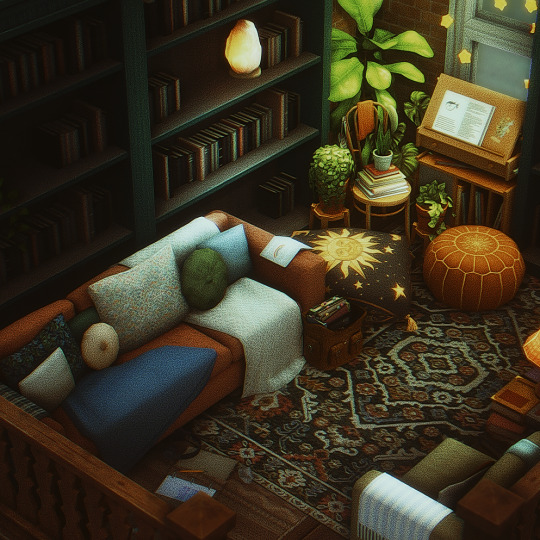
The Paper Trail
↬ WIP
#here’s what i have so far! last night i finished the exterior and mapped out some outlines inside#there’s gonna be a little pub with a photo booth and the bookstore on the end! top has more apts!#this is so therapeutic omg#i visited an older bookshop the other day and i'm trying to pull inspo from that#there were like these huge book piles and it smelled so good in there i'm :')#need to go cc shopping for certain items#might recolor this bookshelf as well so it's all teal#or like teal and brown#i’m so proud of this one#wip#a year in nordhaven: extras
136 notes
·
View notes
Text
Finished The King in Yellow and I have THOUGHTS. They are good ones, I enjoyed it and recommend it
I read it because of Malevolent, I’m not gonna lie. But if you go in expecting lore then you’re gonna be frustrated and disappointed. This isn’t a lore bible it’s the Origin Point.
I went in knowing that the last few short stories were not even explicitly horror, that did not stop me from being bored and wishing that the KiY would show up and fuck up these dumb lovesick French artist students. I will admit that I skimmed parts. They were good stories but KNOW what you’re going into.
THAT BEING SAID, I DON’T THINK THEY WERE UNIMPORTANT TO THE MAIN THEME. In fact I don’t think the main theme of the book Clicked with me until I was reading those stories
Because the subject of the book isn’t necessarily the King in Yellow– he actually features less as the book goes on. The book is about these different characters’ relationships to their past. When a character has a past they are ashamed of, and they either 1) idolize it or 2) try to run away from it because they’re sure they’re unlovable because of it, THAT’S when they fall prey to the King in Yellow. Characters who admit and accept their past not only survive the horrors, but find acceptance from the same loved ones they were so afraid of disappointing.
And if you don’t see that main theme in Malevolent, we’ve been listening to different podcasts.
tl;dr–
Things I did not learn: lots of KiY lore Things I did learn: Why this book has resonated with so many people, including Harlan Guthrie. In fact this is a callout post, Harlan you have a type, I can see you bitch,
#the king in yellow#robert w chambers#malevolent#malevolent podcast#perhaps i will make a post outlining the very little lore i got from the book bc i DID take notes#just dont ask me to explain the sylvia(s) im still not sure what was going on there#but yeah i enjoyed it. i dont think i’ve written in a book this much in like a decade#i think i looked up the meanings of every characters’ name and most of the flowers mentioned akfjsif. which be Too Much thought#but often i was rewarded with interesting connections sooooo
48 notes
·
View notes
Text



sommme habut doodle s
#i doodled these the ither night i really like drawing hislegs can you tell#and pabit too i love it very much wahh 🫶#i also didnt feel like coloring them in cause i thought it would ruin the doodle fhdbdb so I just did an outline#which kinda !! makes him look like hes alive on my sketch book !! <- delusional#idk anyways#smile for me#smile for me game#sfm#s4m#dr boris habit#boris habit#dr habit#my art#traditional art
111 notes
·
View notes
Text
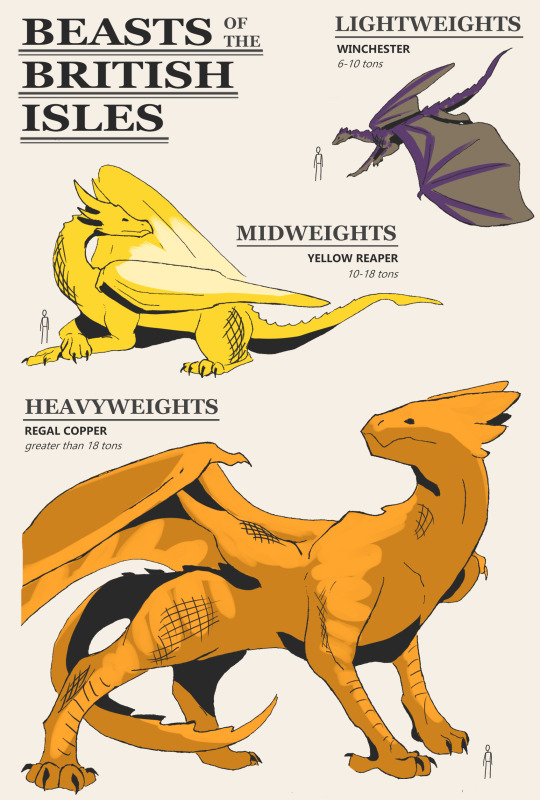
Excerpt from Observations on the Order Draconia in Europe, with Notes on the Oriental Breeds by Edward Howe
A sequel to my other post, (that's been in my drafts for ages) I wanted to illustrate the relative sizes of British Isle dragon breeds! I used what seem to be the most representative models as seen in the books and the Regal Copper because I think it's the largest.
The stick person shown is approximately 6ft tall. I know the lightweights are supposed to be bigger than a horse and smaller than an elephant so I've made my best guess on the Winchester, erring on the small side.
Thanks for reading!
#temeraire#his majesty's dragon#dragons#observations on the order draconia#<= new tag because im having a grand time making up an ID Field Guide for this silly book series#not as happy with this one but i got to draw a regal copper at least!#dont look too closely at the outlines#my scanner ate this one and i am Too Tired to redo it
283 notes
·
View notes